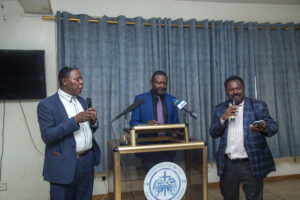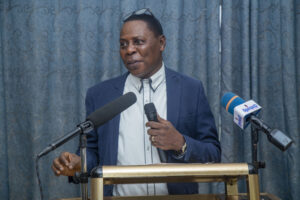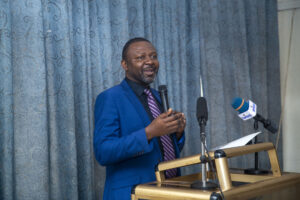 In line with its commitment to shape national discourse on government policies and programmes, the Christian Service University College has held a public lecture on the theme: “Ghana, the ‘Fallen Angel’ shall rise: Lessons from the IMF Bailout”. The lecture was delivered by Dr. Williams Kwasi Peprah, Associate Professor of Finance at Andrews University School of Business Administration (Michigan, USA) and focused on Ghana’s 17 attempts to secure IMF programmes to transform its economy since 1966 to date. The lecture was chaired by Professor Joseph Magnus Frimpong, the former Dean, of KNUST School of Business.
In line with its commitment to shape national discourse on government policies and programmes, the Christian Service University College has held a public lecture on the theme: “Ghana, the ‘Fallen Angel’ shall rise: Lessons from the IMF Bailout”. The lecture was delivered by Dr. Williams Kwasi Peprah, Associate Professor of Finance at Andrews University School of Business Administration (Michigan, USA) and focused on Ghana’s 17 attempts to secure IMF programmes to transform its economy since 1966 to date. The lecture was chaired by Professor Joseph Magnus Frimpong, the former Dean, of KNUST School of Business.
Welcome Address
Professor Sam Afrane, the president of the Christian Service University College noted that the institution has over the years contributed to shaping national discourse on socio-economic issues as a responsible intellectual watchdog through strategic public lecture series. He recounted the numerous lectures that the institution has organized such as: The Menace of Corruption in Ghana, Managing Post-Election Challenges in an Emerging Democracy, Perspectives on LGBTQ and others; and expressed optimism that the current lecture will provide the right impetus for all stakeholders, particularly the political elite to think and act in a way that will secure economic prosperity for all Ghanaians within the context of IMF bailouts. He ended his address by asking stimulating questions to pre-empt the outcome of the lecture.
Chairperson’s Response
In his acceptance speech, Professor Magnus Frimpong,  commended CSUC for organizing the lecture at a very crucial moment where Ghana’s IMF bailout has generated a lot of mixed reactions among Ghanaians. He noted, “I can say with confidence that the CSUC will improve its performance even further in the coming years . . . through the tireless efforts, dedication and commitment of the entire staff”. He expressed that the theme for the lecture was apt, and the background of the speaker was equally fitting. Prof. Frimpong further provided the framework for the smooth take off of the lecture.
commended CSUC for organizing the lecture at a very crucial moment where Ghana’s IMF bailout has generated a lot of mixed reactions among Ghanaians. He noted, “I can say with confidence that the CSUC will improve its performance even further in the coming years . . . through the tireless efforts, dedication and commitment of the entire staff”. He expressed that the theme for the lecture was apt, and the background of the speaker was equally fitting. Prof. Frimpong further provided the framework for the smooth take off of the lecture.
Contextualization of “Fallen Angel” Concept in Finance
Being mindful of the context in which he delivered the lecture, (CSUC being an evangelical non-denominational institution), Professor William Kwasi Peprah explained that contrary to theological interpretations of the concept of “fallen angels” in the Christian thought and practice, the term is used in finance to refer to a “bond that was initially assigned an investment-grade rating but has since been downgraded to junk bond classification”.  He therefore sought to disabuse the minds of section of the audience who may interpret the theme in the light of biblical revelation.
He therefore sought to disabuse the minds of section of the audience who may interpret the theme in the light of biblical revelation.
Historical Context of Ghana’s IMF Programmes
Prof. Peprah provided an outline of Ghana’s IMF programmes since 1966 highlighted the key factors that characterised economic circumstances at the times as well as the specific interventions sought from the IMF.
Ghana’s first attempt to secure IMF support was from 1966 to 1969. By this time, Dr. Kwame Nkrumah had been over throned and the new regime needed the IMF and the World Bank to provide the economic roadmap to growth and prosperity. According to the speaker, the IMF played a supervisory role to make state corporation privatization profitable. The second time Ghana went to the IMF was in 1979 after a “string of corruption scandals, economic mismanagement and military coups” that had slowed economic expansion. The third IMF visit happened between 1983 and 1988 when Ghana had serious crisis with food security as a result of climatic crisis. The IMF was invited to supervise the Structural Adjustment Programme (SAP) which led to the IMF replacing “state-controlled economy’ with “market-oriented one. Prof. Peprah further explained that the fourth IMF programme which happened between 1995 and 2009 was orchestrated by global financial institutions’ quest to embark on debt cancellation in the mid-90s. One significant feature of this period was the emergence of the Highly Indebted Poor Countries’ (HIPC) project. The last attempt to reach out to the IMF was between 2015 and 2022. The ‘dumsor’ crisis greatly affected the economic fortunes of Ghana hence the government at the time went to the IMF for a programme reform intended to accelerate Ghana’s GDP and create jobs while preserving social spending.
Based on the historical antecedents, the speaker gave a general overview of the modus operandi of the IMF and noted that since 1966, Ghana has approached the institution for four credit facilities namely: 1) Standby Arrangement Facility; 2) Short Term Financial Aid; 3) Structural Adjustment Facility and 4) Extended Fund Facility. Prof. Peprah put the blame on lack of fiscal discipline as the most important reason why succeeding governments had had to run to the IMF. He cited a passage in the 2019 budget statement presented to the parliament by the Minister for Finance who criticised the Mahama administration for reckless economic management and promised to “maintain a combination of economic discipline and vibrancy that will ensure that we will not have to be rescued in that manner in the future”. Prof. Peprah analysed the economic performance indicators of the former Mahama and current Akuffo Addo led governments vis a vis their external and internal shocks including the “dumsor”, Covid 19 pandemic, and Russia-Ukraine War and concluded that lack of fiscal discipline has been the bane of Ghana’s economic management.
Based on the careful analysis of the economic performance indicators, he had earlier predicted in October 26, 2021 that Ghana should have sought IMF bailout for liquidity support but did not happen. He bemoaned the apparent neglect of the fiscal responsibility role of the finance ministry over succeeding governments which include sourcing for funds, allocation of funds, accountability of funds and financial sustainability of funds despite the fact that “qualified” civil and public servants are always put in charge.
Fallen Angel: Ghana’s Credit Ratings and Bond Activities
Prof. Peprah explained Ghana’s credit rating and bond activities since 2003 and noted that the picture had not been too good. He further provided a historical data on Ghana’s rating by Fitch, Moody and Standard and Poor to drum home the fact that the situation has not been impressive as postulated by budget statements from succeeding governments. He remarked, “Ghana has been a fallen angel since it entered the international capital market”. Prof. Peprah provided data on the rating activities of Ghana and observed that by the end of 2020, the fallen angel (Ghana) market value had increased from less than 10% to more than 15% of the overall high yield universe market, more than doubling from pandemic levels to $287 million.
Lessons from the 2022 IMF Bailout
Prof. Peprah pointed out eleven key lessons that have been learnt from the impact of IMF bailout on government fiscal behaviour as follows:
- government commits to living within its means
- government adopts context specific approach in dealing with economic decisions;
- government ensures balancing short-term stabilization and long-term development agenda;
- government considers social effects of economic reforms and ensure protection of vulnerable groups;
- government strengthens domestic institutions and governance architecture;
- government commits to monitoring and evaluation mechanisms;
- government builds local institutions and their capacity;
- government adopts flexible and adaptable design and execution of its programmes;
- government collaborates and secure assistance at international levels;
- government integrates stakeholder engagement and communication of its programmes and policies;
- government explores the significance of its long-term vision and commitment to sustainable development.
The Fallen Angel to a Rising Star
At the end of every tunnel, there is a light. Prof. Peprah in his lecture did not only focus on the causes and lessons but proffered sustainable and practical solutions to dealing with the current IMF bailout. He noted that even though the programme aims at ambitious restoration of macroeconomic stability and debt sustainability, “Ghana can only become a rising star if she follows her own programme objectives and debt sustainability strategies, while laying the foundation for higher and more inclusive growth”. The content of Ghana’s IMF programme include large and frontloaded fiscal consolidation to bring public finances back on a sustainable path, complemented by efforts to protect the vulnerable; adopting tight monetary and flexible exchange rate policies to bring inflation back to single digits and rebuild international reserves; focus strongly on preserving financial stability in the wake of domestic debt restructuring; and finally, engage in reforms to encourage private investment and growth, including improving governance, transparency and public sector efficiency. Prof. Peprah was of the view that the ratings of Ghana will drastically improve and her status as a fallen angel revised if the current and future governments commit to the programme.

